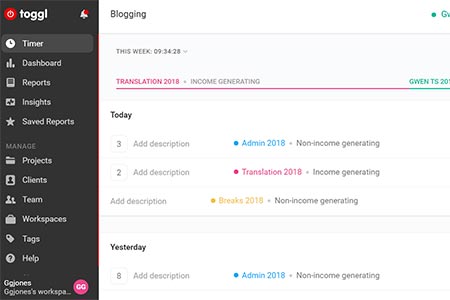In my career as a professional translator, time management is one of my greatest ongoing challenges. In this article I’m going to share with you how I track my time. Doing this is essential to know how much to charge and to make sure you’re using your time profitably.

What time-tracking tool do I use?
Toggl is my time-tracking tool of choice this year. It’s available online at toggl.com. I have no affiliation with this company. I’m just a fan.
Why do I love Toggl so much?
Usability
You run it in your browser. It takes all of ten minutes to figure out how to use it and you’re set to go.
Freemium app
It’s free. You have the option to upgrade to a premium version, though I haven’t found it necessary so far.
Detailed reports
You can generate reports for different time periods and get them emailed to you. So, it’s easy to gather data to analyse.
Simple error correction
Sometimes I forget to click play or stop, but it takes just a second to correct this.
How do I use it as a professional translator?
I set up a specific project for each of the different activities I do in my day. These include translating and copywriting, working with trainees on our Spanish-to-English translation courses, admin, blogging, accounts, quoting, marketing and training. I’ve also created a project for breaks, to track how much downtime I have during my working day.
I classify these projects as “income generating” and “non-income generating”. Then, during my day, I continuously run the app, switching projects every time I switch activities.
Read this article about how to track your time to help you identify how much to charge and make sure you’re being profitable. #freelancers #translators Share on XWhy should a professional translator track their time so obsessively?
I have two points.
1. Assess profitability
I want data on everything I’m doing at every hour of my working day so that I can analyse it. That’s how I discover whether I’m using my time profitably or not. I need to know how many hours I’m generating income compared to doing activities that don’t generate income. Beyond that, in each specific translation activity, I want to know how long I took. That way, I know whether I’m charging enough for different text types and projects.
If you’re familiar with my webinar New Getting Your Prices Right 2018, you’ll know that I’ve been doing this for years. As a result of this ongoing study, I know exactly how much I need to charge for everything. I’ve streamlined processes, changed the type of work I accept, altered my working hours and applied a continuous improvement process to my working life. In short, I’ve made myself more efficient and more profitable.
2. Have factual information available to my clients for transparency
In Lucy’s article “10 Reasons to Use Professional Translation Services and not Google Translate“, one of her points was that a professional translator provides transparency in their quotations. But how can we do that? With this tool, I can set up a project for a client. In that project, I can write every activity I do and record how long it takes. The client can have the report with the invoice. That means they can see whether or not they think the time I’m spending on these activities is reasonable and fair.
Of course, I don’t do that if I’m charging by the word because the customer has agreed to a closed fee. With that fee structure, the time I take to complete the project is my business. But if it’s a copywriting, transcreation or proofreading project charged by the hour then it’s very useful. I also think it has great potential for PEMT (post edited machine translation). (In this context, professional translators may enjoy this article on Slator.com by Silvio Picinini: “Why Translators Should Start Thinking About How Much Their Hour Is Worth“.
Sign up for our newsletter!
Just enter your email in the sidebar to get all our news straight to your inbox. Remember to safelist us!





What a great tool and how useful it must be when working as a freelancer! Certainly, one which we will pass onto our translators. Thanks!
Thank you for reading!